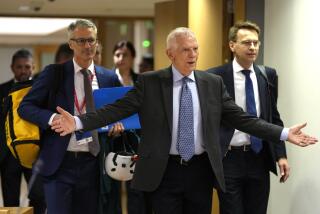Russia Gives Initial OK to Nuclear-Waste Storage Plan
- Share via
MOSCOW — Russia’s lower house of parliament gave preliminary backing Thursday to a potentially important hard-currency earner for the strapped former superpower: storing other countries’ nuclear waste.
But a senior U.S. official said Thursday night that Washington might withhold its cooperation with the plan if it isn’t satisfied with certain aspects of Russian nuclear policy, such as Moscow’s cooperation with Iran in building nuclear power stations.
In a lopsided initial vote on amending Russian law banning such nuclear waste imports, the members of the Duma approved plans by the Ministry of Atomic Affairs, or Minatom, to allow Russia to take in thousands of tons of spent nuclear fuel from a variety of European and Asian countries.
Although fiercely opposed by many environmentalists, the proposal has backing from some experts in the nuclear nonproliferation movement, who see it as a logical way for Russia to raise billions of dollars needed to finance the cleanup of existing contaminated nuclear zones and to build a safe, deep underground repository for spent fuel from Russia and other countries.
Defenders of the plan also see it as a way to provide revenue and jobs for the Russian nuclear industry, and to help nonproliferation by reducing Russia’s temptation to export its nuclear technology to countries such as Iran to earn money.
Because building and maintaining nuclear waste storage facilities is politically sensitive in most countries, the ministry has estimated that Russia could earn $20 billion in the next 10 years by offering to become an international nuclear waste repository.
If any such plan is to go ahead, however, the United States would have to approve it first, experts say. That is because the vast majority of spent nuclear fuel that would go to Russia for storage would originate in the United States, and the U.S. government has the contractual right to approve or disapprove of its transfer and use.
One firm U.S. condition is that none of its spent fuel be reprocessed. Another issue is Iran. The United States has been trying for years to persuade Russia to pull out of an arrangement to assist the Islamic Republic with building a nuclear power station that the United States fears Tehran could use to help develop nuclear weapons.
“Our position has been consistent: . . . that we do not intend to proceed without answers on the Iran issue. This simply must be resolved for any collaboration to go forward,” Ernest Moniz, the U.S. undersecretary of Energy responsible for cooperation with Russia, said in a telephone interview.
Such disputes, however, are still down the road. In the Duma, it was clear that lawmakers are eager in theory to proceed with the lucrative waste-storage project. The package of amendments passed, 320-30, in Russia’s lower chamber, with eight abstentions and hardly any debate.
Two more votes by the Duma are necessary for final passage, and the project must be approved by parliament’s upper chamber and signed by President Vladimir V. Putin.
The revenue would be used in part by Russia’s struggling nuclear industry to clean up already badly contaminated sites, Minatom says.
But the proposal has outraged Russian and international environmental groups, notably Greenpeace, which had campaigned actively against it--even mounting a drive for a national referendum on the question.
“Countries have a moral obligation to deal with their own spent nuclear fuel rather than sending it away to a poor country that cannot deal with its own waste,” Greenpeace activist John Walter said after the vote. “The Duma has prostituted itself to the nuclear industry.”
Greenpeace argues that Russia has an abysmal record of handling its own nuclear materials and therefore should not be given the job of maintaining waste from other countries. The organization also says there is the risk of accidents as the materials are transferred to Russia from other countries.
But Jon Wolfsthal, an associate at the Washington-based Carnegie Endowment for International Peace, said he sees “a real debate going on about the benefits or the problems.”
“There are some real potential benefits,” he said. “The question is how the deal is structured and what happens over the long term.”
The Nonproliferation Trust, a U.S.-based nonprofit organization, already has drafted a business plan that could form the basis of the necessary cooperation agreement between the United States and Russia to build a nuclear-waste storage facility, said Thomas Cochran, a nuclear scientist active in environmental and nonproliferation issues who helped draft the blueprint.
*
Maura Reynolds of The Times’ Moscow Bureau contributed to this report.
More to Read
Sign up for Essential California
The most important California stories and recommendations in your inbox every morning.
You may occasionally receive promotional content from the Los Angeles Times.













